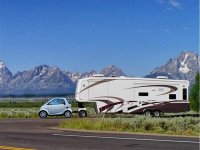Dave, My personal experiences make me wary of the ASHS.
I had the trailer connector cord fall out on the highway and had no trailer brakes on my 20,000# trailer. I realized it when pulling off the highway on a short ramp with a cross road just ahead at the stop sigh. If I'd been driving a pickup with or without an ASHS, I believe it would have been dangerous getting stopped in a hurry, if I could have done it at all. The brakes on my Volvo are designed to stop more than my combined weight, so I stopped easily.
While traveling west of St Louis on I70 near Wentzville, I slowed suddenly because cars were braking quickly to avoid an accident just ahead. I was rammed from behind by a Silver Eagle bus that locked brakes and couldn't swerve to avoid me. It was a huge impact, caving in the whole front of the bus and totalling my trailer. It also damaged the massive ET air hitch which didn't let go as would most hitches. Because I was in my Volvo, we weren't hurt, but had it been a pickup, I'm sure it would have been considerably worse. The bus was towed away, but we drove away.
The added weight of the ASHS would have exacerbated my drive train weaknesses in my F550.
I'd much rather have my Volvo ( paid $24,000 for it) than a $50,000 pickup plus a $10,000 ASHS.
This is just my personal opinion and not meant to disparage the ASHS.
I had the trailer connector cord fall out on the highway and had no trailer brakes on my 20,000# trailer. I realized it when pulling off the highway on a short ramp with a cross road just ahead at the stop sigh. If I'd been driving a pickup with or without an ASHS, I believe it would have been dangerous getting stopped in a hurry, if I could have done it at all. The brakes on my Volvo are designed to stop more than my combined weight, so I stopped easily.
While traveling west of St Louis on I70 near Wentzville, I slowed suddenly because cars were braking quickly to avoid an accident just ahead. I was rammed from behind by a Silver Eagle bus that locked brakes and couldn't swerve to avoid me. It was a huge impact, caving in the whole front of the bus and totalling my trailer. It also damaged the massive ET air hitch which didn't let go as would most hitches. Because I was in my Volvo, we weren't hurt, but had it been a pickup, I'm sure it would have been considerably worse. The bus was towed away, but we drove away.
The added weight of the ASHS would have exacerbated my drive train weaknesses in my F550.
I'd much rather have my Volvo ( paid $24,000 for it) than a $50,000 pickup plus a $10,000 ASHS.
This is just my personal opinion and not meant to disparage the ASHS.

